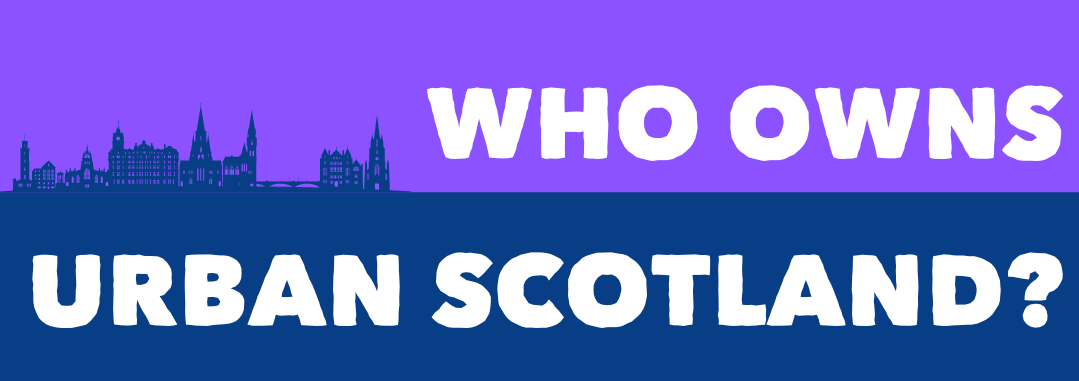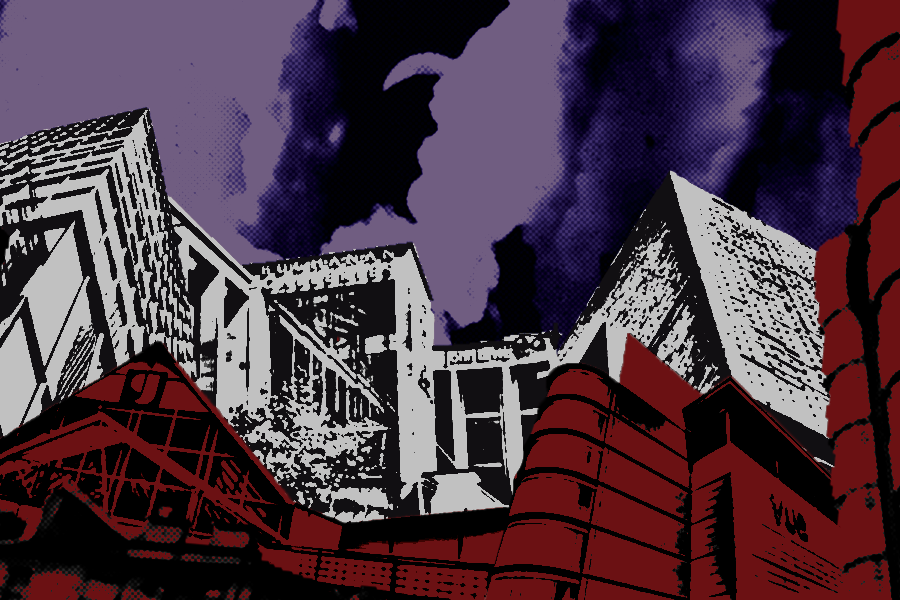Only a third of properties on Scotland’s busiest shopping streets are owned by companies registered in the country, The Ferret can reveal, with tax haven firms, property investors, pension firms and overseas companies owning swathes of our city centres.
Our exclusive analysis reveals that as of July, just nine per cent of properties on Edinburgh’s Princes Street and 11 per cent on Glasgow’s Buchanan Street were owned by companies registered in Scotland.
Across all city centres, just 33 per cent of the properties were owned by Scottish companies – some via tax haven subsidiary firms.

Experts called The Ferret’s findings “depressing” and urged tougher legislation to ensure ownership of Scotland’s city centres was fully transparent.
There is no suggestion that property owners with links to offshore entities are breaking tax laws.
But the Tax Justice Network claimed that less tax will be paid in this country as a result and the offshore businesses are making money from the custom of the very people who suffer from sophisticated tax avoidance practices. Ordinary tax-paying local businesses would be “first to go bust,” the group added.
The findings are part of The Ferret’s Who Owns Urban Scotland series, which investigates the firms behind major parts of Scotland’s towns and cities.
We need the owners of our high streets to be engaged in their reform.
Willie Rennie MSP, Scottish Liberal Democrats
We looked at the ultimate owners of all 3,444 shops, offices, car parking facilities and other commercial properties in the main shopping districts of Scotland’s eight cities listed by the Scottish Assessors Association (SAA).
Nationwide, 28 per cent of high street properties were owned by companies registered in the rest of the UK – usually London – 27 per cent were owned abroad, while 12 per cent were owned by individuals or unknown entities.
Of all 3,444 properties, one in four were owned by companies via offshore tax havens like Luxembourg, Jersey, Guernsey, Switzerland, the Isle of Man and the US state of Delaware. At least 16 per cent were owned by pension funds – including that of a tobacco firm – or firms which provide pensions and insurance.
Nearly half of Edinburgh’s Princes Street properties were owned by a London property investor via its insurance subsidiary.
About 40 per cent of Sauchiehall and Buchanan Street in Glasgow were owned via tax haven firms, as was 35 per cent of Aberdeen’s Union Street.
Streets with fewer flagship stores had more mixed ownership. In Dundee’s main shopping streets, 56 per cent were owned by Scottish companies. This was also the case with 61 per cent of properties on Edinburgh’s Royal Mile and Lawnmarket, and 55 per cent on Inverness High Street.
Little public information was available about many of the companies that own our high streets, including what they do and the people behind them.
As of July, just nine per cent of properties on Edinburgh’s Princes Street and 11 per cent on Glasgow’s Buchanan Street were owned by companies registered in Scotland.
Tax avoidance and transparency campaigners have warned that ultimate company owners in some “secrecy jurisdictions” can avoid property taxes.
For example, rather than a traditional property transaction taking place, the ownership of a company could change hands through the selling of shares – with stamp duty avoided altogether.
Residential properties do not feature on the SAA’s database. The association relies heavily on self-reporting of changes in ownership, which means some businesses may recently have changed hands.
High street pensions, property and tax havens
High street properties are often prime investment vehicles for property, pension, insurance and tax haven firms. Almost half of Princes Street properties were owned by Prudential – an insurance firm and subsidiary of the London-based property investor, M&G.
Standard Life – bought by London’s Phoenix Group in 2021 – owned 37 properties in Edinburgh and Stirling.
Glasgow’s @Sipp Pension Trustees owned 31 properties across several cities and Bristol’s Imperial Tobacco owned 25 properties on Edinburgh’s George Street. These firms are not based in – nor have any links to – tax havens.
High profile UK organisations have also snapped up high street property via dedicated pension arms. The BBC owned 21 properties in Edinburgh, British Airways owned 22 on Aberdeen’s Union Street, and John Lewis owned 18 in Glasgow.
Established property development and investment firms have also acquired swathes of Scotland’s high streets – often via offshore tax haven subsidiaries.
Major owners of Glasgow’s Buchanan Street include subsidiaries of the Swiss holding company Arioso AG, which owned 81 properties in Princes Square shopping centre, and the Guernsey-registered HIH Invest Buchanan Street, which owned 72.
Hazledene House owned 56 properties on major shopping streets in Edinburgh, nine in Aberdeen and one in Dunfermline. The firm, ultimately owned in the Isle of Man, has counted Scottish Enterprise among its tenants.
The Scottish Government’s investment arm gave the company £572,152 to cover rents, service charges and business rates when it leased a Stirling office from Hazledene between 2017 and 2019.
A Scottish Enterprise spokesperson said it leased the office space long before Hazledene owned the property, and had not paid the firm since it sold the office in 2018.

On Aberdeen’s Union Street, 54 properties were held by Guernsey-owned Carrick Properties, while the Inverness-based Emslie Commercial Property Services owned 23.
Hazledene, Carrick, Stockshape could not be reached for comment. HIH Invest Buchanan Street and Arioso did not respond to requests to comment.
Some tax haven firms have little public information about them, while others with generic names are in fact linked to established UK companies.
For example, a Luxembourg firm was the listed owner of five Princes Street properties. The company appeared to be ultimately owned by the UK-registered property firm, Savills – via a string of other parent firms in both Luxembourg and Jersey.
Savills also has fully-owned subsidiaries in tax havens including Bahrain, the Cayman Islands, Hong Kong and Singapore.
But the property giant told The Ferret that it does not own the Princes Street properties. “They are owned by a real estate investment fund which is managed by Savills Investment Management, a regulated fund manager,” said a spokesperson.
“The property owner is subject to UK corporation tax on the annual profits of its property rental business and will be subject to UK corporation tax on any gain which may arise when the property is eventually sold.”
‘Multiple forms of social damage’
Alex Cobham, chief executive of the Tax Justice Network, said: “The Ferret’s findings make for depressing reading. The use of offshore structures to own commercial assets results in major losses of public revenue, including through the avoidance of capital gains tax. It can also provide cover for a failure to ensure that labour rights are respected and fully met.”
He claimed the failure to address these issues led to “multiple forms of social damage”, and meant the Scottish Government had less income for public services and to meet its important commitments to curb child poverty and inequality.
“The UK governments of the last decade have consistently failed to address corporate tax abuse, even though the data shows a return of £56 for every pound invested in this area,” Cobham added.
Richard Kerley, researcher and professor of management at Queen Margaret University, said: “On principle I do not think that tax haven ownership – which is usually a kind of ghost company – is in any way desirable. We need to legislate to ensure that ownership is transparent and in the right hands.”
The use of offshore structures to own commercial assets results in major losses of public revenue, including through the avoidance of capital gains tax. It can also provide cover for a failure to ensure that labour rights are respected and fully met.
Alex Cobham, Tax Justice Network
The Scottish Liberal Democrats’ MSP Willie Rennie said: “We need the owners of our high streets to be engaged in their reform. Too often, however, they are remote and uninterested.
“I’m not especially exercised as to who owns the properties but I do care about what they do. I would therefore make an appeal to them to engage in rebuilding the success of our high streets or other action may be taken to force them to do so.”
A Scottish Government spokesperson said: “Businesses have an ethical obligation to deal openly with their tax affairs and to avoid engaging in artificial arrangements simply to reduce their tax liabilities, but ultimately the powers to tackle the use of tax havens remain reserved to the UK Government.”
The UK Government did not respond to requests for comment.
Who Owns Urban Scotland is an investigation by The Ferret looking into the firms controlling Scotland’s towns and cities. Support our journalism by becoming a member for £5 a month at theferret.scot.















Can you name the properties so consumers can decide what businesses they choose to legally support please.